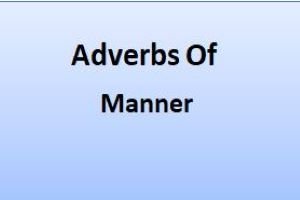Adverbs of manner definition:
An adverb of manner indicates how something occurs. It refers to how something is accomplished or done.
Or
An adverb of manner modifies or alters a sentence to describe how something occurs, such as how fast or slowly it occurs. They’re frequently introduced after the main verb or the object. They can provide extra detail to sentences, just like other adverbs, providing the reader with a clearer idea.
The following are some examples of adverbs that are widely used to express.
Quickly, fastly, slowly, simultaneously, loudly, carefully, eagerly, energetically, slowly, Quietly, immediately, angrily, easily, happily, wistfully, etc.
Position of adverbs of manner in a sentence:
It comes right before the main verb.
She quickly sipped the water.
It comes right after the primary verb.
He said it nervously.
He spoke proudly.
She cooks well.
If the main verb contains an object, the adverb of manner should be placed directly after the object or before the verb, but if we want to add the adverb directly before the object, then the sentence will be incorrect.
Consider the following examples:
She carefully studied the letter. (before the verb)
She studied the letter carefully. (after the direct object)
She carefully studied the letter. (before object) incorrect
She beautifully plays the game. (before the verb)
She plays the game beautifully. (after the direct object)
She plays beautifully in the game. (before object) incorrect
We ate the pizza greedily. (after the direct object)
We greedily ate the pizza. (before the verb)
We ate the pizza greedily. (before object) incorrect
She gave us advice generously. (after the direct object)
She generously gave advice. (before the verb)
She gave us generous advice. (before object) incorrect
If the verb’s object has appeared before a preposition, the adverb of manner can be placed either before or after the preposition.
Examples
- The dog ran sadly towards his dead master.
- The dog ran towards his dead master sadly.
Adverbs of manner should always appear right after verbs that don’t have an object (intransitive verbs).
Examples
- Tony talked loudly to attract his friend.
- She returned quickly.
Here are some typical adverbs of manner that are nearly always placed straight after the verb Well, badly, hard, and fast are a few of them.
- She sang well, despite being tired.
Importance of the Adverb of Manner:
We must know the importance of the adverb of manner because even without using an adverb of manner, we can complete our sentences if we add the adverb of manner, which will enhance and glorify the meaning of the sentence and also provide an answer to the question of how the action is carried out, for example.
“He plays cricket.”
If we add an adverb of manner, then it can explain more about his quality of playing.
“He plays cricket amazingly.”

